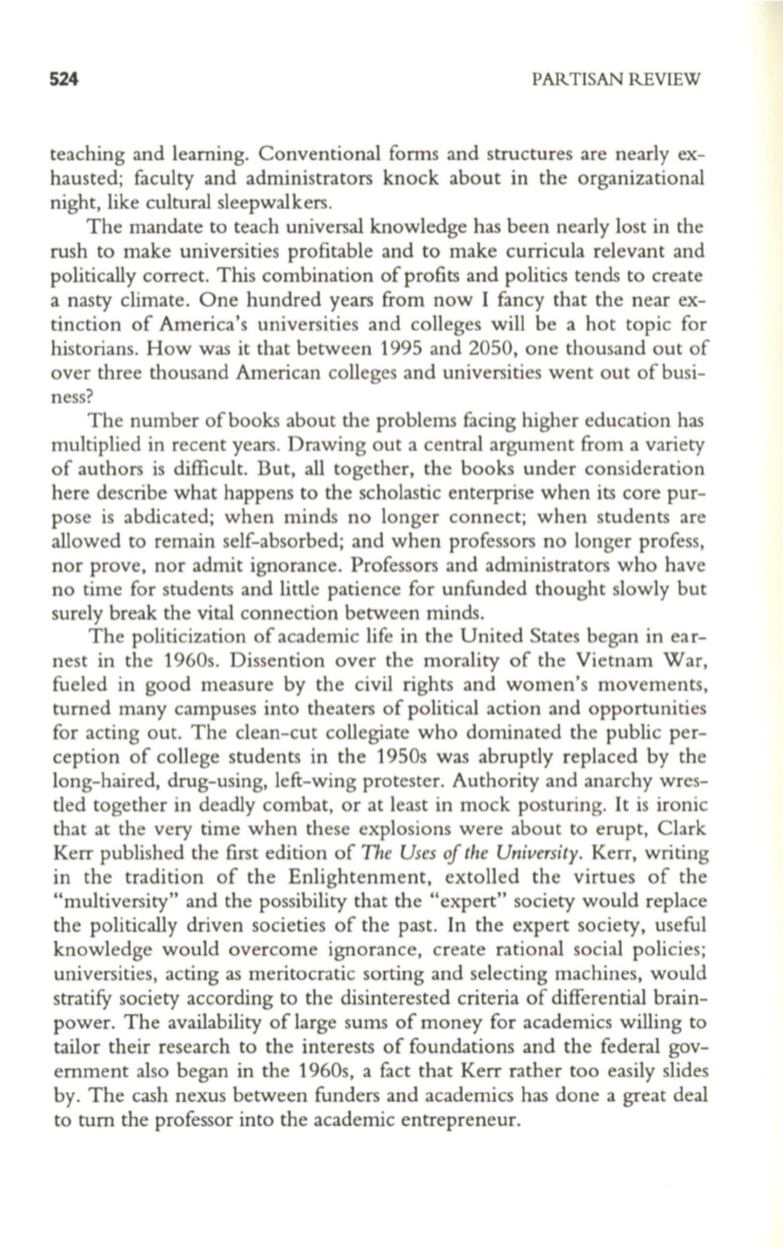
524
PARTISAN REVIEW
teaching and learning. Conventional fonns and structures are nearly ex–
hausted; faculty and administrators knock about in the organizational
night, like cultural sleepwalkers.
The mandate to teach universal knowledge has been nearly lost in the
rush to make universities profitable and to make curricula relevant and
politically correct. This combination of profits and politics tends to create
a nasty climate. One hundred years from now I fancy that the near ex–
tinction of America's universities and colleges will be a hot topic for
historians. How was it that between 1995 and 2050, one thousand out of
over three thousand American colleges and universities went out of busi–
ness?
The number of books about the problems facing higher education has
multiplied in recent years. Drawing out a central argument from a variety
of authors is difficult. But, all together, the books under consideration
here describe what happens to the scholastic enterprise when its core pur–
pose is abdicated; when minds no longer connect; when students are
allowed to remain self-absorbed; and when professors no longer profess,
nor prove, nor admit ignorance. Professors and administrators who have
no time for students and little patience for unfunded thought slowly but
surely break the
vital
connection between minds.
The politicization of academic life in the United States began in ear–
nest in the 1960s. Dissention over the morality of the Vietnam War,
fueled in good measure by the civil rights and women's movements,
turned many campuses into theaters of political action and opportunities
for acting out. The clean-cut collegiate who dominated the public per–
ception of college students in the 1950s was abruptly replaced by the
long-haired, drug-using, left-wing protester. Authority and anarchy wres–
tled together in deadly combat, or at least in mock posturing.
It
is ironic
that at the very time when these explosions were about to erupt, Clark
Kerr published the first edition of
The Uses of the University.
Kerr, writing
in the tradition of the Enlightenment, extolled the virtues of the
"multiversity" and the possibility that the "expert" society would replace
the politically driven societies of the past.
In
the expert society, useful
knowledge would overcome ignorance, create rational social policies;
universities, acting as meritocratic sorting and selecting machines, would
stratify society according to the disinterested criteria of differential brain–
power. The availability of large sums of money for academics willing to
tailor their research to the interests of foundations and the federal gov–
ernment also began in the 1960s, a fact that Kerr rather too easily slides
by. The cash nexus between funders and academics has done a great deal
to turn the professor into the academic entrepreneur.


